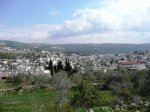by Elana Lubka
(as part of our Stories of Inspiration series)
“Change is to talk,” Bushra, 22, stressed in our conversation. I smiled at this, for one of the first things I noticed about Bushra was how comfortable she was speaking both English and Hebrew. Bushra attributes her fluency in English and Hebrew to having been raised in Abu Ghosh, an Arab village in the Judean Hills outside of Jerusalem. Not a part of the West Bank, Abu Ghosh is known for its amiability with neighboring Jewish villages and often plays hosts to visiting Jewish groups who wish to sample some of their famous hummus. This constant exposure to Israeli and foreign Jews has enabled her to become more familiar with the “other” than other Palestinians living in East Jerusalem or the West Bank.
Raised in a Muslim family, Bushra stressed that her and her family’s identity was quite different than the average Palestinian’s. Her family is quite liberal, accepts the other and has never tried to influence their faith onto Bushra’s faith and opinions. Her family approved sending her to a school that planned projects connecting Arabs with local Jews and funded Hebrew classes for children in the elementary school. In the second grade, Bushra started to learn Hebrew at school and from the age of ten, Bushra began helping her parents understand legal and other official documents in Hebrew. This opened Bushra’s eyes substantially, allowing the unknown to become known. This liberal setting in which Bushra grew up does not exempt the difficulties she encountered growing up as an Arab in Israel. She recounted that during the Intifada, she would accompany her mother around, who wears the hijab, and was aware of the different treatment they received. Following these incidents, her mother took to covering her hair differently to better blend in. She even began adopting the Jewish Orthodox fashion of tying her hair up with a scarf in a knot behind her neck.
In lieu of these ups and downs, Bushra immediately signed up for an upcoming ICCI Face to Face program that was presented to her. Upon meeting the other Palestinians in the group, she instantly realized the massive differences between them and herself. She recalled being judged because she was from Abu Ghosh and not from the heart of the conflict, the West Bank. Bushra noted that the most common sentiment directed towards her was, “You don’t suffer like us; how can you talk about the Palestinian suffering [like we do]?”. Feeling trapped in the middle, Bushra explained that she began reflecting on her dual lives: her life as a member of a Palestinian Muslim family, who, however, has had life opportunities other Palestinians in East Jerusalem have not had. Yet as the sessions progressed, Bushra came to understand that although the other Palestinians judged her for growing up in Abu Ghosh – a city that some say treat Israelis better than Arabs for financial purposes – they also looked to her as an example of an Arab who successfully straddles both worlds: the world of the Palestinians and the world of the Israelis. Bushra realized that her unique situation was a privilege, something she should be grateful for.
Taking her open-mindedness with her to the States, Bushra recalled having an incredible time a summer camp in Holmes, New York. As a portion of the Face to Face program, the whole group traveled to the States to join two other participating groups, one from South Africa and another from Northern Ireland. Together, these three diverse groups discussed what it means to make change and the tools needed to be open-minded. Reflecting on this experience, Bushra emphasized that as humans, we all share the same values and care about the same things. One’s nationality or religion does not make one’s values more esteemed than the other’s. Change is achievable by seeing the “other” as a person, not as a nationality. She attributes this positive outlook to her friendship with Roni, a Jewish participant in her Face to Face program. Bushra noted that because they share the same dreams and endure the same sufferings, a great friendship is able to grow. Bushra expanded on her friendship with Roni and observed that if more people saw the way they do, more friendships are able to blossom. With this in mind, I asked Bushra to expand on her life in Tel Aviv. She explained that living in Tel Aviv has enabled her to feel more relaxed and escape the social hierarchy in Jerusalem. She added that, “I can feel the tension [in Jerusalem].” Bushra explained that by living in Tel Aviv, she is treated as an equal because of her fluency in Hebrew and her intense studies at Tel Aviv University. In Jerusalem, “there is no interest to know the other.” In Tel Aviv, she is welcomed.
Bushra currently lives in Tel Aviv and is studying Gender Studies, Political Science, English Literature and American Studies at Tel Aviv University. She hopes to pursue her MA upon completion of her Bachelor’s Degree.
Filed under: Alumni Community, Face 2 Face, ICCI Programs, Interviews, Islam in Israel, Personal Stories and Testimonies, Stories of Inspiration |



Leave a comment